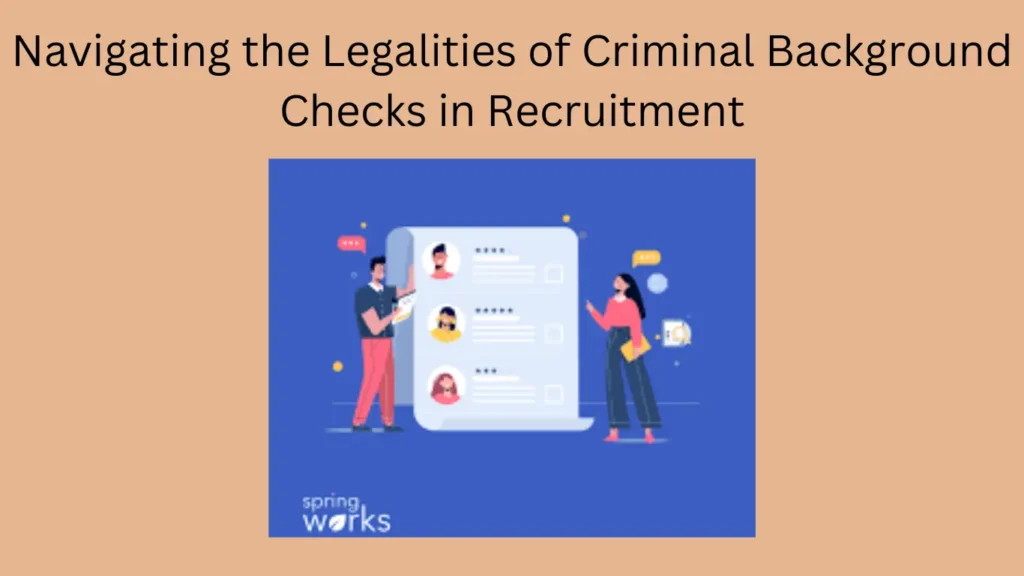Introduction
Conducting criminal background checks is an essential part of the recruitment process, but it must be done in compliance with various legal requirements. Navigating these legalities ensures that your business avoids potential legal issues while protecting the rights of candidates. This guide will help you understand the key legal considerations and best practices for conducting criminal background checks in recruitment.
Understanding the Legal Framework
- Fair Credit Reporting Act (FCRA)
- Overview: The FCRA governs how employers can use background checks in hiring decisions. It ensures that the process is fair and transparent to candidates.
- Requirements: Employers must obtain written consent from candidates before conducting a background check. They must also provide candidates with a copy of the report and a summary of their rights if any adverse action is taken based on the report.
- Equal Employment Opportunity Commission (EEOC) Guidelines
- Overview: The EEOC provides guidelines to prevent discrimination in the hiring process.
- Considerations: Employers should evaluate the nature of the crime, the time elapsed since the offense, and its relevance to the job role. Avoid blanket policies that exclude candidates based on any criminal history.
- State and Local Laws
- Variability: Laws regarding criminal background checks can vary significantly by state and locality.
Best Practices for Legal Compliance
- Develop a Clear Background Check Policy
- Transparency and Consistency: Create a policy that outlines when and how background checks will be conducted. Ensure the policy is applied consistently across all candidates.
- Compliance: Align your policy with federal, state, and local laws to ensure full compliance.
- Obtain Informed Consent
- Candidate Awareness: Inform candidates about the background check process and obtain their written consent before proceeding.
- Disclosure: Provide candidates with a clear disclosure form that explains their rights under the FCRA.
- Conduct Individualized Assessments
- Contextual Evaluation: Assess the relevance of any criminal history in the context of the job role. Consider factors such as the nature of the offense, the time elapsed, and the candidate’s subsequent behavior.
- Avoid Blanket Policies: Instead of automatically disqualifying candidates with any criminal history, evaluate each case individually to avoid potential discrimination.
- Provide Pre-Adverse and Adverse Action Notices
- Pre-Adverse Action Notice: If you plan to take adverse action based on the background check, provide the candidate with a copy of the report and a summary of their rights before making a final decision.
- Adverse Action Notice: If the decision is finalized, send an adverse action notice explaining the decision, including information on how to dispute the report’s accuracy.
- Maintain Confidentiality and Security
- Protecting Privacy: Handle background check information with strict confidentiality.
- Secure Storage: Store background check reports securely and in compliance with data protection regulations to protect candidate privacy.
Addressing Common Challenges
- Dealing with Inaccurate Information
- Verification: Work with reputable screening services that provide accurate and up-to-date information. Verify any discrepancies with the candidate.
- Correction Process: Have a clear process in place for candidates to dispute and correct inaccurate information in their background check reports.
- Managing Delays and Complexities
- Efficient Processes: Streamline your background check process to avoid unnecessary delays.
- Legal Guidance: Consult with legal professionals to navigate complex legal requirements and ensure your processes are up to date with current laws.
- Balancing Fairness and Safety
- Fair Evaluation: Balance the need for workplace safety with fair hiring practices. Ensure that your background check policy does not disproportionately impact any group.
- Second Chances: Consider the context of offenses and allow candidates the opportunity to explain and provide evidence of rehabilitation or positive behavior since the offense.
Conclusion
Navigating the legalities of criminal background checks in recruitment requires a careful and informed approach. By understanding the relevant laws, developing clear policies, and ensuring transparency and fairness in the process, employers can protect their business while respecting candidate rights. Implementing best practices for legal compliance helps create a fair, safe, and productive workplace.
For further Inquires Contact Us
FAQs
What laws govern criminal background checks in hiring?
Answer:The Fair Credit Reporting Act (FCRA) and the standards of the Equal Employment Opportunity Commission (EEOC) are the primary statutes. Local and state legislation might also be relevant.
The Fair Credit Reporting Act (FCRA): What is it?
Answer: The FCRA regulates how employers can use background checks, requiring written consent from candidates and proper handling of adverse action notices.
What are EEOC guidelines for criminal background checks?
Answer: EEOC guidelines advise evaluating the nature, time, and relevance of offenses to the job role to prevent discrimination and ensure fair hiring practices.
What are “ban-the-box” laws?
Answer: “Ban-the-box” laws prohibit employers from asking about criminal history on initial job applications to provide fairer opportunities for candidates with a criminal record.
How can employers ensure compliance with background check laws?
Answer: Employers should develop clear policies, obtain informed consent, conduct individualized assessments, provide required notices, and maintain confidentiality of records.
